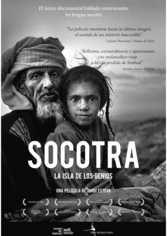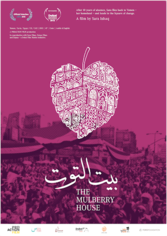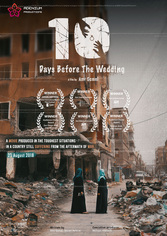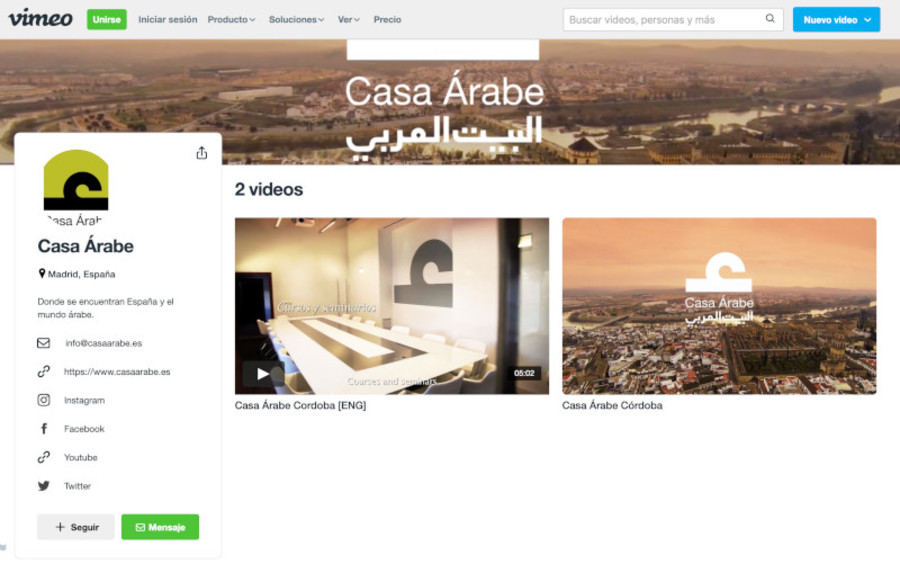Films
Index / Activities / Films / Online cinema in December
Online cinema in December
December 18, 2020Each film will be available for 72 hours as of the indicated date.
ONLINE
Casa Árabe’s Vimeo channel.
Each film will be available for 72 hours as of the indicated date.
Assignment of viewing codes after signing up with the proper form.
Films shown in the original language version with subtitles in Spanish.
We will be showing the films included in the series “Tales of Yemen,”
but now in an online version. The movies will be available for free on
Casa Árabe’s Vimeo channel on the indicated dates (you must request a
viewing code in advance).
Given the large number of requests we have received this autumn to extend our film screenings to include online formats, for all those Casa Árabe fans who were unable to see the films in the series Tales of Yemen, we are offering the film series once again, free of charge, online through Casa Árabe’s Vimeo channel.
This series accompanies the exhibitions “Displacements: Yemen Diasporas and “Arabian Arcadia,” which place the spotlight on that Arabian Peninsula country. “Displacements: Yemen Diasporas” also brings up a very current topic, that of the diaspora, migration and exile through the works of photographers Thana Faroq and Shaima Al Tamimi. These two exhibitions will remain on display in our exhibition halls until January 10 and 24, respectively.
Tales of Yemen
From 2011 to 2019, the Republic of Yemen saw the streets of large urban centers fill with people clamoring for revolutionary social and political change, followed by a transitional period that wavered towards armed conflict, degenerating into the civil war that has been raging in the country from the end of 2014 to today. This timeline is what the various Yemeni directors in this film series have reflected, questioned and documented through their work. From revolution to war, the Yemeni cinema that has developed within this atmosphere invites us to reflect not only upon the history and politics of that country, but also on the role that contemporary artists and filmmakers play in its writing, archives and documentation.
The films to have been included in this series were selected by Anahi Alviso, an expert on Yemen’s society, politics and culture.
Each film will be available for 72 hours as of the indicated day, and you may only watch it after requesting a viewing code using the registration form to be published on our website.
This series accompanies the exhibitions “Displacements: Yemen Diasporas and “Arabian Arcadia,” which place the spotlight on that Arabian Peninsula country. “Displacements: Yemen Diasporas” also brings up a very current topic, that of the diaspora, migration and exile through the works of photographers Thana Faroq and Shaima Al Tamimi. These two exhibitions will remain on display in our exhibition halls until January 10 and 24, respectively.
Tales of Yemen
From 2011 to 2019, the Republic of Yemen saw the streets of large urban centers fill with people clamoring for revolutionary social and political change, followed by a transitional period that wavered towards armed conflict, degenerating into the civil war that has been raging in the country from the end of 2014 to today. This timeline is what the various Yemeni directors in this film series have reflected, questioned and documented through their work. From revolution to war, the Yemeni cinema that has developed within this atmosphere invites us to reflect not only upon the history and politics of that country, but also on the role that contemporary artists and filmmakers play in its writing, archives and documentation.
The films to have been included in this series were selected by Anahi Alviso, an expert on Yemen’s society, politics and culture.
Each film will be available for 72 hours as of the indicated day, and you may only watch it after requesting a viewing code using the registration form to be published on our website.
-

Film: Video Poems and “Soqotra, Island of the Djinns”
December 04, 2020Film available as of 12:00 p.m. on December 4, for 72 hoursONLINECasa Árabe’s Vimeo channel. Film available as of 12:00 p.m. on December 4, for 72 hoursFilms shown in the original language version with subtitles in Spanish.As of December 4, four video poems will be available on our Vimeo channel for 72 hours. They were developed as part of the project “Yemen in Conflict,” by the LAAF, as well as the documentary “Soqotra: Island of Djinns,” by Jordi Esteva. Viewing codes sold out.With the cooperation of the Liverpool Arab Arts Festival (LAAF), Casa Árabe is presenting four video works which combine poetry and film. These video poems were created in 2019 on the basis of original poems by contemporary Yemeni poets, created as part of the project “Yemen in Conflict: Popular literary heritage as an expression of conflict and a tool for its resolution,” the goal of which is to protect and preserve traditional and contemporary Yemeni popular literature despite the current conflict. These poems have, in turn, been reinterpreted by visual artists and filmmakers, thus taking on a new dimension while becoming part of a “living archive” that bears witness to the experiences of Yemenis in the diaspora currently residing in Britain. The video poems are:
- No Words by Mariam Al-Dhubhani
(Poem by Ahmed Abdul Raqeeb Alkhulaidi)
(2019, 5 min.)
- The Streets Will Walk Me Home, by Olivia Furber
(Poem by Amina Atiq)
(2019, 3 min.)
- He Grew Old, by Diyala Muir
(Poem by Hamdan Dammag)
(2019, 2 min.)
- Two Coloured House, by Noor Palette
(Poem by Dr. Abdul Hakim Al-Qazi)
(2019, 2 min.)
We will also be showing the documentary “Soqotra: Island of the Djinns,” by Jordi Esteva (Spain, 2016, 65’).
This is the first film ever recorded entirely in Soqotri, the South Arabian language related to the language spoken in the ancient Kingdom of Sheba. It portrays life on the remote island of Soqotra, adrift in the Indian Ocean between the Horn of Africa and the Arabian Peninsula, but currently forming part of Yemen. During the monsoon, the island remains isolated, which has contributed to preserving a unique ecosystem in the world. Myrrh and incense trees grow wild in many places there, as does the mystical “draco,” the tree of dragon’s blood. For Herodotus, it was the island of the Phoenix, and for the Arabs that of the giant bird Roc from the tales of Sindbad. The screening of this film is meant to complement the exhibition “Arcadia Arabiga” by the same author. You can see it in one of the exhibition halls at Casa Árabe’s headquarters in Madrid.
Awards and Festivals: Visions du Réel Festival (Nyon, Switzerland, 2016); International Full Frame Festival (United States, 2016); Ethnocineca, International Documentary Film Festival of Vienna (Austria, 2016); BFI Film Festival of London (UK, 2016); International Film Festival of Nancy (France, 2016); Documenta Madrid, 2016; Malaga Film Festival, 2016.
-

Films: “Karama Has No Walls” and “The Mulberry House”
December 11, 2020The films will be available as of 12:00 p.m. on December 11, for 72 hoursONLINECasa Árabe’s Vimeo channel. The films will be available as of 12:00 p.m. on December 11, for 72 hours Assignment of viewing codes after signing up with the proper form.Films shown in the original language version with subtitles in Spanish.As of December 11, we will be showing these two films forming part of our film series “Tales of Yemen” on our Vimeo channel. Viewing codes sold out.Karama Has No Walls, by Sarah Ishaq
(United Arab Emirates, 2012, 25 min.) Documentary short
Karama Has No Walls is the riveting eyewitness account of the tragic day that changed the course of the revolution in Yemen, when pro-government snipers opened fire on a peaceful gathering of protesters, causing national outrage and ultimately leading to the end of 33 years of autocratic rule.
Preview
The Mulberry House, by Sarah Ishaq
(Yemen, United Kingdom, Syria, Egypt, United Arab Emirates, 2013, 64 min.) Documentary
Sarah was born in Yemen 30 years ago, to a Yemeni father and a Scottish mother. During her teenage years, she begins to feel ill at ease with the world around her, so at the age of 17, she decides to run off to Scotland to live with her mother. Her father says she can only leave if she will promise not to give up her Yemeni roots. Sarah says she will not, but in the end she breaks her promise. Ten years later, in 2011, Sara returns to Yemen, having turned into another person. She is determined to face her past and wants to rediscover her roots in the place where she was born. She unexpectedly returns to a country about to live through a revolution, as part of the movement of Arab Springs.
Awards and Festivals: Amsterdam International Documentary Film Festival, 2013; Dubai International Film Festival (UAE, 2013; Human Watch Rights International Festival (United Kingdom, 2014); DokFestival Munich /Germany, 2014); Jury Award (Human World Festival, Austria, 2014).
-

Films: “The Tales of Ali” and “Ten Days Before the Wedding”
December 18, 2020Films available as of 12:00 p.m. on December 18, for 72 hours.ONLINECasa Árabe’s Vimeo channel. Films available as of 12:00 p.m. on December 18, for 72 hours. Assignment of viewing codes after signing up with the proper form.Films shown in the original language version with subtitles in Spanish.As of December 18, we will be showing these two film screenings, the last in our film series “Tales of Yemen” on our Vimeo channel. We will be back in 2021 with more films.The Tales of Ali, by Rahman Taha
(2019, 11 min.) Short subject documentary
In this film, Rahman Taha explores the history and culture of Yemen through the experiences of an elderly man who has spent most of his life working on its coffee plantations. Through the experiences of Ali, who has lived through the main conflicts in Yemen over the last century, viewers will be able to get a different look at Yemen, placing the nation’s events in the background to highlight Ali’s humorous, mundane and sometimes incomprehensible perceptions of reality.
Ten Days Before the Wedding, by Amr Gamal
(Yemen, 2018, 120 min.) Fiction
In 2015, Rasha and Mamoon, a young couple from the port city of Aden in Yemen, had planned to celebrate their wedding, but the war cuts their plans short. Three years later, they try to hold the wedding again, but just ten days before, new obstacles begin to unfold. Will their story have a happy ending? Or will the scars from war, economic crisis and other life circumstances keep them apart? This is the first film in the last decade to come out commercially in Yemen, and it is the first fully Yemeni production ever.
Preview

